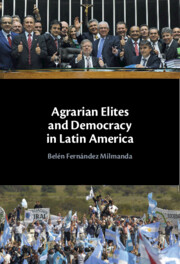Book contents
- Agrarian Elites and Democracy in Latin America
- Agrarian Elites and Democracy in Latin America
- Copyright page
- Dedication
- Contents
- Figures
- Tables
- Acknowledgments
- Abbreviations
- 1 Introduction
- 2 A Theory of Agrarian Elites’ Political Participation
- 3 Chile
- 4 Brazil
- 5 Argentina
- 6 Conclusions, Extensions, and Implications
- Book part
- References
- Index
2 - A Theory of Agrarian Elites’ Political Participation
Published online by Cambridge University Press: 15 November 2024
- Agrarian Elites and Democracy in Latin America
- Agrarian Elites and Democracy in Latin America
- Copyright page
- Dedication
- Contents
- Figures
- Tables
- Acknowledgments
- Abbreviations
- 1 Introduction
- 2 A Theory of Agrarian Elites’ Political Participation
- 3 Chile
- 4 Brazil
- 5 Argentina
- 6 Conclusions, Extensions, and Implications
- Book part
- References
- Index
Summary
This chapter first describes the dependent variable – agrarian elites’ strategies of political influence – and its three categories (nonelectoral, party-building, and candidate-centered) in terms of their reliability and costs. Then, it introduces a new theory to explain the variation in agrarian elites’ strategies of political influence under democracy. It highlights the role of two independent variables – perception of an existential threat and intragroup fragmentation – to explain when and how agrarian elites will organize in the electoral arena. It argues that agrarian elites will enter the electoral arena only when they perceive an existential threat. In turn, landowners’ level of intragroup fragmentation conditions the way they organize their electoral representation. Where landed elites are cohesive, they will engage in party-building. In contrast, highly fragmented elites will prefer a nonpartisan, candidate-centered strategy of representation, supporting individual like-minded politicians across partisan lines. Lastly, the chapter assesses three main alternative explanations, previous history of electoral organization, electoral rules, and the relevance of congress as a policymaking arena.
Keywords
- Type
- Chapter
- Information
- Agrarian Elites and Democracy in Latin America , pp. 22 - 64Publisher: Cambridge University PressPrint publication year: 2024

